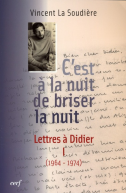
Je suis venu vivre tout haut
Collection Cerf Littérature
208 pages - févr. 2008
25,00€
Dans ce livre, Georges Lauris parle de son parcours : de ses origines, de sa formation, de ses engagements, de ses éblouissements, de ses colères à l'occasion... À le lire, on découvre une vie vécue sous le signe de la foi. Mais, au-delà de ses conditionnements ou de ses circonstances, c'est la vie elle-même qui intéresse Georges Lauris. La vie avec tous les mystères qui la composent : la joie, le désir, la souffrance, la mort... La vie surtout vécue à la première personne – il aime à répéter cette formule étonnante : « Si je ne suis pas moi, qui le sera ? » Vécue aussi en communion avec les autres. On ne dira jamais assez combien l'amitié tient, aux yeux de Georges Lauris et dans son existence la plus quotidienne, la première place. Une vie vécue sous le signe de la foi ne signifie certes pas un chèque en blanc à l'ordre du conformisme ! Pour Lauris, vivre sous le signe de la foi signifie un appel d'autant plus pressant à vivre libre et responsable de sa propre vie. D'où le ton qu'il choisit d'adopter : il dit ce qu'il a à dire. Tout simplement. Il essaie de vivre et de s'exprimer à niveau de conscience. Un tel son de voix est salutaire. On y entend l'accent du sud. On y sent le tempérament bien trempé d'un paysan cévenol, un terrien, qui a marché dans les vignes avant que de traverser les œuvres de Platon, Aristote, saint Thomas d'Aquin et pas mal d'autres... On y découvre un religieux qui a dialogué avec la culture de son temps et aussi avec quelques grands noms : Claudel, Giono, Char. Surtout on se laisse promener par un poète qui, même quand il raconte sa vie, ne se résout pas à suivre des lignes trop convenues ou trop droites mais préfère gambader et saisir des couleurs, la grâce de certains moments, l'émotion de quelques enjeux de l'existence, de certains courages, de certaines lâchetés aussi... Bref, tout ce qui fait une vie. Somme toute, ce qui parle dans le livre de Lauris, c'est une âme demeurée fidèle à elle-même et à ses engagements. Une âme toujours sur le qui-vive.
--
In this book, Georges Lauris speaks of his life: his origins, education, engagements, things that fill him with a sense of marvel and even his outbursts of anger... As we read, we discover a life lived under the sign of faith. But, apart from conditions or circumstances, it is life itself that interests Georges Lauris. Life and all its mysteries: joy, desire, suffering, death... Life told in the first person singular – he is fond of saying: ‘If I weren’t myself, who would be?’ But this is also a life lived in communion with others; we could never exaggerate how great a role friendship plays in the daily life of Georges Lauris. Of course, a life lived under the sign of faith doesn’t mean conformity at any price! For Lauris, living under the sign of faith means living one’s own existence freely and responsibly. This is why he adopts this frank tone, saying exactly what he has to say, in all simplicity. The sound of such a voice is salutary. We can hear the southern accent; we can feel the strong character of the peasant, a man of the soil, who walked through the vineyards before going through the pages of Plato, Aristotle, Saint Thomas Aquinas and many others... We discover a cleric who has maintained a dialogue with the culture of his times and with some of its great names: Claudel, Giono, Char. But above all we allow ourselves to be led by a poet who, even when he recounts his life, cannot make up his mind to stay within certain confines. A man who prefers to wander and observe the colours, the grace captured in certain moments, the strong emotions of life’s great experiences, examples of courage, and cowardice too... In short, those things that make up a life. To sum up, what we hear in this book is a soul that has remained faithful to itself and its engagements. A soul that is constantly on the alert.
--
In this book, Georges Lauris speaks of his life: his origins, education, engagements, things that fill him with a sense of marvel and even his outbursts of anger... As we read, we discover a life lived under the sign of faith. But, apart from conditions or circumstances, it is life itself that interests Georges Lauris. Life and all its mysteries: joy, desire, suffering, death... Life told in the first person singular – he is fond of saying: ‘If I weren’t myself, who would be?’ But this is also a life lived in communion with others; we could never exaggerate how great a role friendship plays in the daily life of Georges Lauris. Of course, a life lived under the sign of faith doesn’t mean conformity at any price! For Lauris, living under the sign of faith means living one’s own existence freely and responsibly. This is why he adopts this frank tone, saying exactly what he has to say, in all simplicity. The sound of such a voice is salutary. We can hear the southern accent; we can feel the strong character of the peasant, a man of the soil, who walked through the vineyards before going through the pages of Plato, Aristotle, Saint Thomas Aquinas and many others... We discover a cleric who has maintained a dialogue with the culture of his times and with some of its great names: Claudel, Giono, Char. But above all we allow ourselves to be led by a poet who, even when he recounts his life, cannot make up his mind to stay within certain confines. A man who prefers to wander and observe the colours, the grace captured in certain moments, the strong emotions of life’s great experiences, examples of courage, and cowardice too... In short, those things that make up a life. To sum up, what we hear in this book is a soul that has remained faithful to itself and its engagements. A soul that is constantly on the alert.
- Dimensions : 155x240x15
- ISBN : 9782204085571
- Poids : 350 grammes
DU MÊME AUTEUR
> VOIR TOUS LES LIVRES DE l'AUTEUR
DANS LA CATÉGORIE GUIDES DE VIE
Pierre Claverie, la fécondité d'une vie donnée
de Jean-Jacques Pérennès ,Gianni Festa
204 pages - août 2018
C'est à la nuit de briser la nuit
Lettres à Didier, I (1964-1974)
de Vincent La Soudière
704 pages - mars 2010










